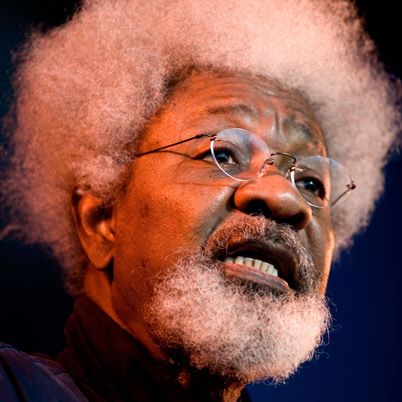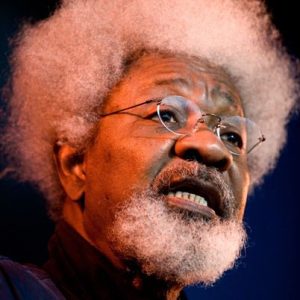
HOW I WROTE ‘THE KING AND HORSEMAN’ IN TWO AND A HALF DAYS — WOLE SOYINKA

Nigeria’s Noble Laureate, Professor Wole Soyinka said the power to respond to his subconscious made his to write the book, The King and his Horseman in two and half days.
Prof. Soyinka, who disclosed this at the unveiling of CreaTent and Books of Aphorisms by one of his mentees, Mohammed Bello in Abuja on Saturday, said that the idea had been in him for many years before deciding to put it into writing in a record time.
He cited The King and his Horseman as one of his best ever, stressing that his creativity made the book unique, despite the fact that other people have written about the myth about the King and the horseman.
As the keynote speaker, Prof. Soyinka said: “Finally, I couldn’t help it anymore. So instead of committing, I found pleasure. Which is trying to restore a symbol that is standing right now, which has proved to me one of the most successful plays I’ve ever written.
“But the important thing, and that’s what I want to address, the important thing is that writing that play did not begin when I sat down. Right? No. Obviously, it had been there.
“You see yourself in the subconscious, and finally, it is ready. Many people would not believe that I wrote that play in two and a half days. Literally, a month and a half.
“That was the nature of it. The power to respond to it. Not necessarily immediately.”
Prof. Soyinka, who encouraged writers not to be discouraged when they are stuck in their writing, also admonished
writers not to be discouraged when they are stuck in their writing.
He said: “And don’t worry if you wanted to write a play and it just didn’t come out and you had to do it. Go and do other things. Go and play soccer if you like.
“Go and listen to music. Go and see your friends. Have a party. Join a construction gang who occupy themselves with the community. Anything whatsoever.
“Inspiration is not mysterious. It’s a question of just opening your mind to take up what others are not. So I recommend this pamphlet.
“Teachers, students, would be creative people. And always remember that there’s a link between people who tend to separate the literary arts, the painting, the talking. The thing is different from technological savvy.”
He also disclosed how he failed in his attempt to become a mechanic.
He said: “Both make up for the same line of creativity. Motor vehicle, discovery of solar energy, many important technologies have marvellous creative processes, triggers, that are always available all around. I always call myself the failed mechanic because I’m so fascinated by technology, mechanical things.
On his part, Governor Uba Sani of Kaduna State blamed the absence of deep thinking and lack of educated analysis on national discourse from graduates of higher institutions of learning on dying reading culture.
To this end, he urged writers to double up on their efforts in reviving the nation’s reading culture.
Sani, who was the Chairperson and represented by his Principal Secretary, Prof. Bello Ayuba said he didn’t expect anything other than a great work from someone who has benefitted from the immense experience of this literary colossus, Prof. Wole Soyinka .
He said the fact that the Universal Basic Education Commission (UBEC) has adopted this literary work for use in the country’s public schools is a clear testimony of the worth of the material we are introducing to the public today.
Sani said: “Writers, young and old, should double up on their efforts to ginger the nation into reviving our reading culture, whose side effect is sadly manifest in the absence of deep thinking and educated analysis that we often see in our national discourse and from the products of our higher institutions of learning.
“We in leadership positions at all levels must see this as a challenge; we must not hesitate to encourage efforts such as this in whatever way we can. That way we would rejuvenate interest in learning in and out of the school system for the good of the society.”
The author of CreaTent, Mohammed Bello described the work as a literary arts initiative that was born out of the need to provide a nurturing habitat for young creatives.
According to him: “It is observable that many parents of artistically gifted children in our part of the world often don’t even realize they have a creative child whose gift needs a different kind of attention.”
Bello explained that he started writing from a very young age, though he struggled to find mentors.
He said: “I started writing from a very young age, and although I didn’t know what I was writing. During my university education in the United States, I discovered aphorisms — literary philosophy. These are concise expressions of universal truth, and I have published two books about them.
“I discovered my aphorism in me, and also I decided also to approach a few mentors, so I could get guided in the field of creativity. And also decided to establish CreaTent because I struggled to find mentors.
“I don’t know if I found prof or I attracted Prof. I don’t know, but Professor Wole Soyinka has really been an inspiration and a mentor.
“I founded CreaTent as a hub for parents who have creative children who may not know what signs to look out for, and also for young creatives and a few older ones to come around and see what creativity is all about.”
![]()
